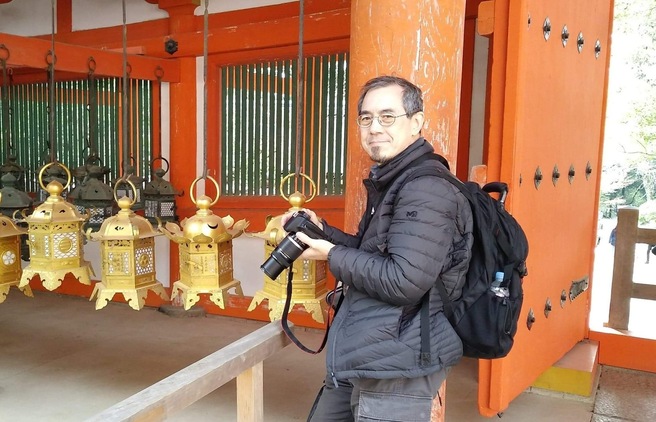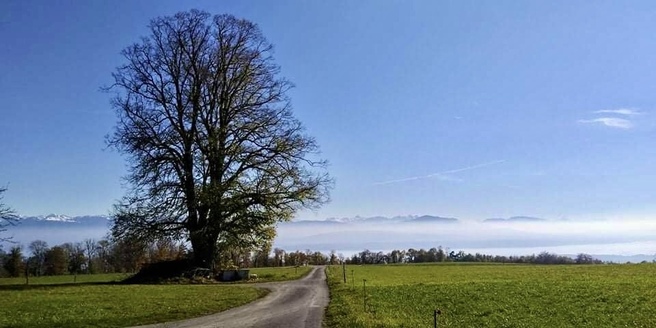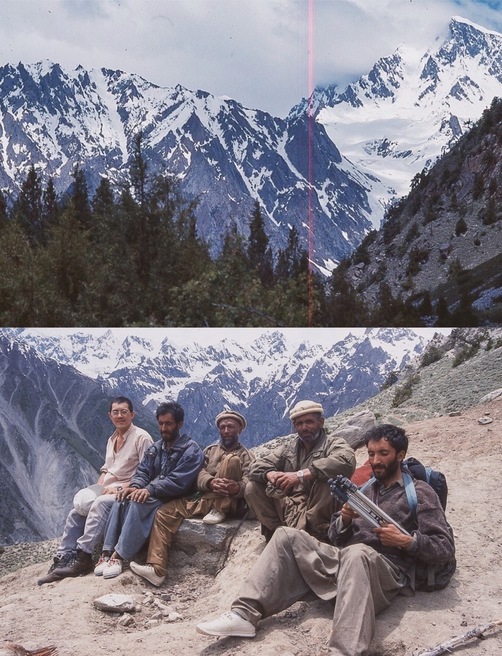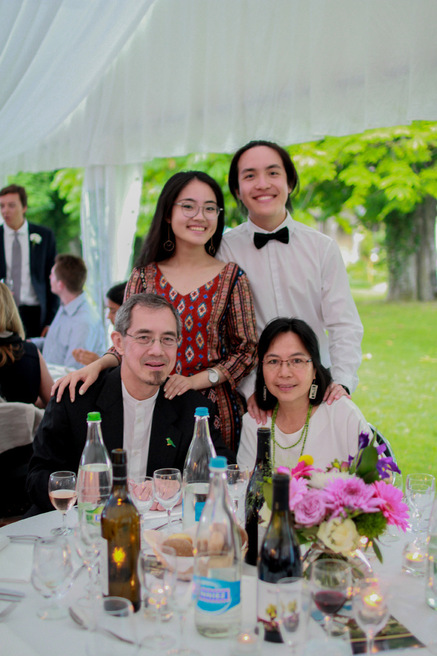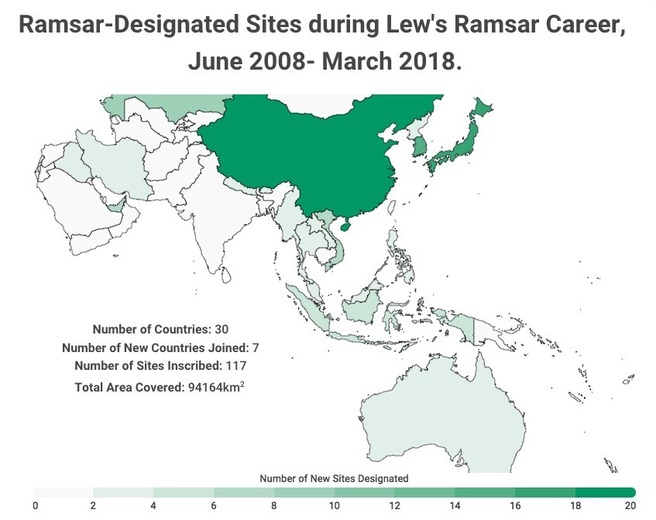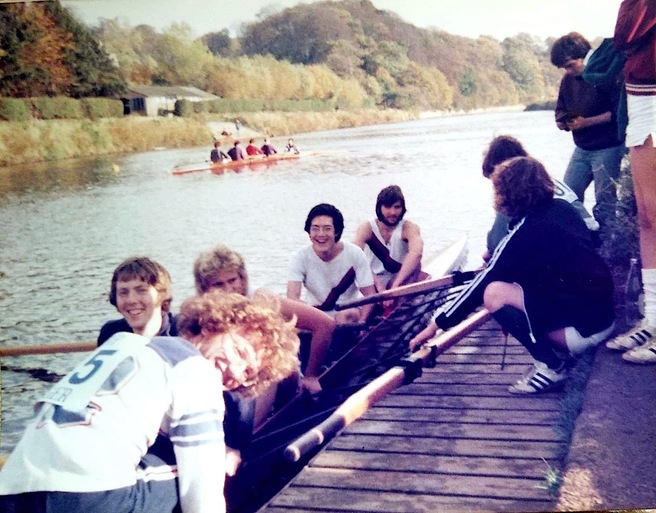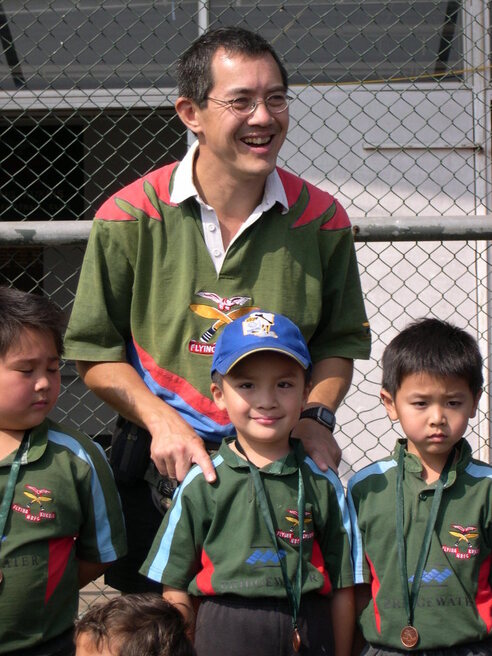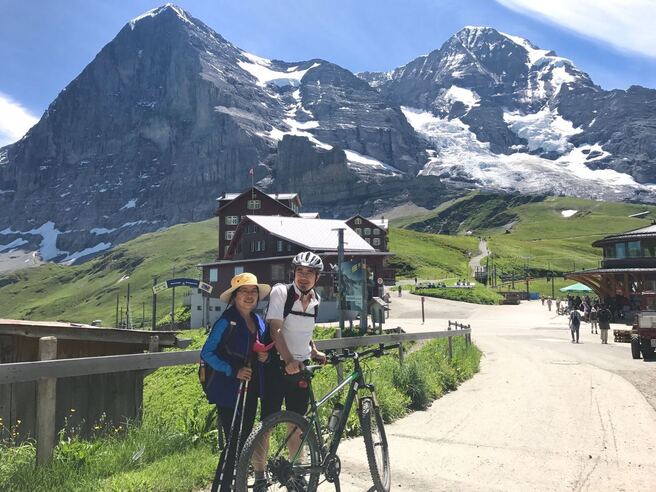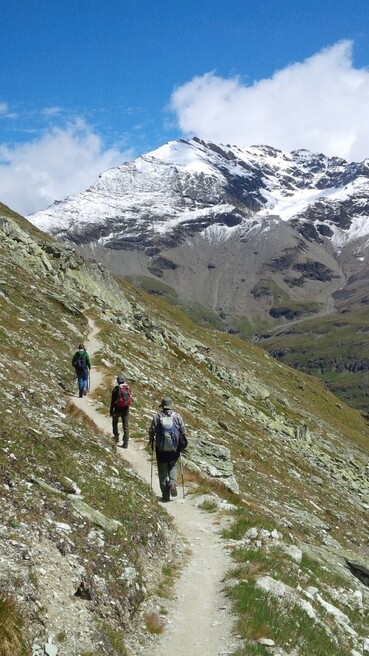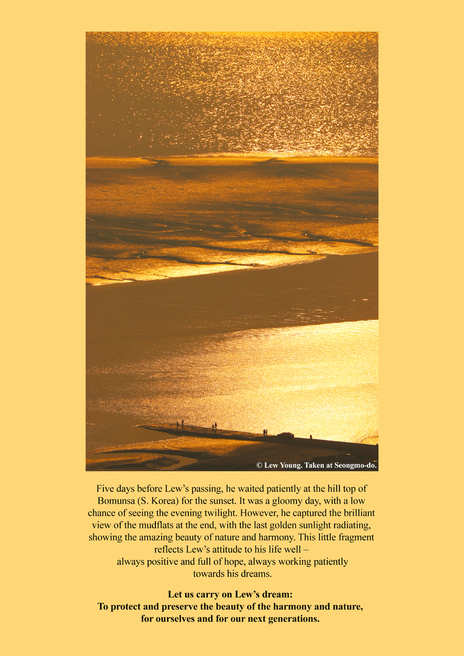Tribute by Professor David Dudgeon (PhD Supervisor to Lew).
Lew Young, who I met initially in 1988, was my first PhD student at Hong Kong University.I was certainly fortunate in that regard.The original arrangement was that Lew would be co-supervised by Brian Morton and myself but, based on his extensive supervisory experience, Brain wisely decided that Lew was sufficiently capable to be left to his own devices. He had, after all, spent a period of voluntary service overseas – in Sierra Leone – and researched East Asian pheasants before joining HKU as a PhD student.Lacking Brian’s insight, I wanted to be a little more involved with Lew’s work, which concerned the ecology of ardeids (egrets and herons) - principally the Chinese pond heron - in and around the Mai Po marshes at Deep Bay, which was then – as now - managed by WWF (HK).
One of the first objectives of the study was to figure out just how many of the birds present at Mai Po.This was more difficult than it would at first seem since the birds would spend part of their time foraging on the Deep Bay mudflats or elsewhere in the vicinity, and part of their day inside the reserve where they would roost or feed around the shrimp ponds (gei wai).So counts made in the reserve fluctuated according to whether the tide was high, when the mudflats were inundated, or low, when the mudflats were exposed.Accurate counts of ardeids therefore depended on tidal conditions, which involved Lew visiting a sequence of census points in the reserve at consistent tidal stages in order to collect comparable data.Since the exact timing of tides varies throughout the year, the counts had to vary accordingly, being made at various times between dawn and dusk, requiring Lew to bicycle rapidly from place to place on the Reserve so as to collect the data he needed.Matters were complicated further by the fact that some of the birds on the Reserve were residents, and others were migrants, so the total population size varied a lot during the year.As can be imagined, Lew spent a lot of time outdoors and, with all that bicycling, he was very fit. During our occasional meetings to discuss his progress, I would blithely suggest that he should add an extra set of counts or census points to his monthly routine without thinking much about how much extra work would be involved, but Lew never complained and was always upbeat about his research.He had a ready laugh – perhaps more of a guffaw – and his presence in a group always contributed to a lightening of the mood.Lew was serious about his research, but he did not confuse that with being ‘serious’ as a person.
Back to Lew’s PhD.In addition to the need for regular (some might say incessant) counts of ardeids, Lew had to observe where the birds were feeding, and how they went about it so as to figure out what they were eating and how much of it they were able to catch.This was quantified by recording how often the birds struck at food as they stalked through shallow water (thereby generating a peck: step ratio), noting whether the strike resulted in a capture, and then estimating the size of the food item (usually a fish or shrimp) from its body length relative to that of the bird’s beak.Many, many hours were spent on such observations.Things became busier still for Lew during the breeding season when he would visit nests in colonies (mainly at the Mai Po and Tsim Bei Tsui egretries) to check on the hatching success of eggs and subsequent growth of the chicks.During these regular visits he also wanted to find what the parents had fed their chicks.This was possible because, as a defense mechanism against potential predators, the nestlings would regurgitate their last meal over any intruder.If he succeeded in dodging the partly-digested offering, Lew could collect what the nestling had eaten and identify it back in the lab.I was able to help out with that since I was familiar with the various aquatic fauna that adult pond herons might choose to feed their nestlings.However, we were both surprised by the sheer variety of items offered: as well as a range of fishes, shrimps and crabs, they included dragonflies, crickets, household cockroaches, earwigs, tadpoles, frogs, and shrews.
On one memorable occasion, while hunched over the microscope examining a sample, Lew exclaimed that the nestlings had seemingly been fed worms by their parents.This was odd since pond herons are not known to eat worms, and it would have been difficult for adult birds to collect enough of them to provide their nestlings with a decent meal.But sure enough, the sample in the petri dish, which came from Mai Po egretry, contained large quantities of pale worm-like stuff.However, the ‘worms’ lacked the segmentation that is typical of aquatic forms.Nor were they intestinal parasites, which are often unsegmented.Not long after, the mystery was solved when Lew told me he had seen egrets and pond herons skulking around the refuse piles at Mai Po village, where they seemed to have developed a fondness for instant pot noodles! (That observation may also help to account for the many household cockroaches fed to nestlings.)
By 1992 Lew’s field work was wrapped up, and he gained a well-deserved PhD in 1993.It is a shock to realise that was over a quarter of a century ago.Shortly after, Lew became the second manager of Mai Po (succeeding David Melville), shepherding the transition of the Mai Po reserve to a Ramsar site in 1995, and subsequently continuing his work on wetland birds and their conservation outside Hong Kong, remaining devoted to that endeavour until his untimely death.While I can certainly claim no credit for Lew’s success as a researcher and conservationist, I am nonetheless proud to have been able to share a small part of his career.He and I interacted closely for several years after his PhD, because I was a member of the WWF Mai Po Management and Development Committee when Lew was reserve manager. He remains in my thoughts even now, as I currently chair the MPMDC and, in formulating a new five-year management plan for the reserve, members are building upon foundations and monitoring programmes established by Lew during the 1990s.
Suffice to say: in no small way, Lew was one of Hong Kong’s conservation champions.And one of the very best of us.
Tribute by David Melville (PhD Supervisor to Lew).
I first met Lew when he came to see me in the late 1980s – he was interested in doing a PhD on birds. Before coming to Hong Kong he had worked on Cheer Pheasants in Pakistan and Cabot’s Tragopan in South China. Hong Kong offered little in the way of pheasants – Ring-necked Pheasants having disappeared by the early 1900s and the only introduction project, for Bamboo Partridge in 1961, having failed. We needed to think of something else.
Mai Po beckoned with its various egrets and herons, in particular the Chinese Pond Heron - a species that was virtually unstudied. There followed a frantic three years of exhausting field work carried out proficiently and with the good humour that we all came to associate with Lew. I remember one day we borrowed a fire engine with an extending ladder so Lew could look at heron nests in the tops of tall bamboos at Mai Po Village egrety.
Lew concluded his thesis with the following:
Ardeids around the Mai Po Marshes depend upon a diversity of wetland feeding habitats – especially fish ponds. Such habitats are, however, being filled in as this rural area is developed. If this trend continues, ardeid populations could decline. It is important to formulate management strategies for the remaining wetland habitats around Mai Po so as to increase their carrying capacity for wildlife.
And so the scene was set for the rest of Lew’s career. No more pheasants – it was wetlands and waterbirds!
Lew took over as manager of Mai Po for WWF Hong Kong in 1991 and worked determinedly to better manage wetland habitats, improve visitor facilities, promote the education and outreach programmes and establish a robust monitoring programme. Mai Po and Inner Deep Bay was listed as a Ramsar Site in 1995, but pressure for development of the remaining wetland areas in the lowland New Territories, and in particular the fish ponds around Mai Po, was increasing.
Lew recognised the importance of involving local communities in conservation. One of his papers on Cheer Pheasants in Pakistan noted the paradox that protecting forests from human activities actually resulted in a reduction in habitat suitable for pheasants.
Lew held a similar view regarding management of Deep Bay’s fish ponds – without some form of management their biodiversity values declined, but an ageing population meant that there were fewer people to manage the ponds. Sustaining the biodiversity values of fish ponds occupied much of Lew’s time – in particular developing relationships with local fishermen, and exploring options for possible future wetland management with both government and the private sector.
Lew left Hong Kong in 2008 to work at the Ramsar secretariat as Senior Regional Advisor for Asia and Oceania. During his ten years at Ramsar our paths crossed occasionally, but not as often as I would have liked.Nonetheless he maintained an interest in Mai Po – for example, participating in a multi-party stakeholder workshop in 2016 to discuss possible options for future management of the Mai Po Inner Deep Bay Ramsar Site – a continuing cause for concern both locally and to the Convention Secretariat.
In March last year Lew moved to South Korea as CEO of the East Asian-Australasian Flyway Partnership – completing another circle in that he had previously, whilst still at Mai Po, Chaired the Shorebird Working Group of the Asia-Pacific Migratory Waterbird Conservation Committee – a forerunner of the Flyway Partnership.
A New Zealand colleague, Bruce McKinlay, who participated in the Flyway Meeting of the Parties in Hainan last December commented on Lew’s qualities as a leader of his staff at the Secretariat, as a leader in the chair of the MOP, and as a leader behind the scenes building capacity of those around him. He noted that “Lew was always an open listener and gave even handed reasoned responses. His politeness was always on display”.
Last year the Democratic People’s Republic of Korea joined both the Ramsar Convention and the Flyway Partnership – Lew played an important role in supporting both of these. I was fortunate in 2017 to try to fill Lew’s shoes at a technical workshop in DPRK helping them prepare for accession to Ramsar – the high regard that they had for Lew was very apparent.
Lew started his wetland career here, in his student days, living at Island House. As my downstairs neighbour he was to be seen late at night writing up his earlier pheasant research, before heading off at dawn to start another day with the herons. Occasionally he allowed himself a break to come upstairs to use my library – and use this as an excuse to have a drink and a chat.
Throughout all of the incredible energy that Lew put into his professional work there was always a warm and generous person, with a smile and sense of humour. Lew we are immeasurably sad at your passing, but we thank you for your friendship, for your example, and for your selfless dedication to wetland and waterbird conservation that have had such wide-reaching benefits.
Our thoughts are with you, Deborah, Naomi and Cennydd.
Tribute by Michael Lau (WWF-HK colleague and friend to Lew).
We all gathered here today because of one very special person, Dr Lew Young. We are a diverse crowd. Some are his university mates who spent many joyful days together in nature, football pitch and pubs. Some sweated with Lew for years to provide a safe haven for migratory birds. Others had intense meetings together to chart the future of wetlands. Some came because the magical Mai Po had provided many exciting moments and memorable images. There are new friends who heard a lot about him but only met him recently. What is in common is that we all are privileged to have interacted with Lew and he had touched and even infected us with his sincerity, dedication, kindness, humor, and selfness caring for others. In a way we are better because of Lew.
Lew also made Mai Po, Deep Bay and many wetlands spread across the region better. We can see the success when taking a stroll in Mai Po or when captured by a flock of waders dancing over the approaching tide. This achievement was not accomplished by Lew alone, but with the crowd here and many more of Lew’s friends and colleagues who could not be with us today. Thank you, Lew, for forging this special bond and the noble example you set which will no doubt continue to guide us. Our hearts are with you, Deborah, Omi and Cennydd.
Tribute by Yoon Lee (EAAFP Secretariat colleague and friend to Lew).
Mrs. Deborah Cha, Naomi and Cennydd, member of the Lew’s family, colleagues of WWF Hong Kong, distinguished guests and friends of Lew. My name is Yoon Lee, one of Lew’s colleagues at East Asian-Australasian Flyway Partnership in South Korea.
Today we say goodbye to Lew. He was a beloved husband, son, father, brother, friend, and colleague. I have worked with Lew since he joined the EAAFP as Chief Executive in March last year. He was a great boss to EAAFP staff, a respected conservationist around the world, and an inspirational mentor of many people. He selflessly placed others first always, showed genuine kindness and empathy whomever he meets. He used to leave his door open in the office so that people can feel comfortable to approach him and discuss any issues.
He was a great listener. He valued the voice of the local people, such as fishermen and farmers, especially those who are living surrounded by wetlands, birds, and the nature. He was a true conservationist from the bottom of his heart. And it touched many people’s heart.
Lew was a true humanist. Despite his leadership role in the EAAFP, Lew was a very humble person and would treat everyone equally with genuine respect for human being.
I still remember the times when all EAAFP staff members went birdwatching together. We went many beautiful places in Korea. Not only was he excited about watching birds, but he really tried to help young interns to enjoy bird watching. I would never forget his smiles over excitement when he was telling us about rare birds he found.
The EAAFP is very saddened to let him leave us. His footprint in EAAFP is tremendous in many ways from the beginning to the end. Although he is leaving, his will and commitment will be implemented continuously with the supports of Partners and friends around the world.
May God Bless Lew Young, and may he rest in eternal peace.
Tribute by Bena Smith (WWF-HK colleague and friend to Lew).
My deepest condolences to Deborah, Omi and Cenny. Lew was a friend, my mentor for the past 12 and half years. I miss him immensely. With his passing, we not only lost a conservation giant but a skilled and passionate educator.
I first met Lew after joining the Mai Po team in 2004. His passion and commitment to the conservation and protection of wetlands was clear from day one; his personal drive to achieve meaningful change not only in Deep Bay but around Asia was clear; his understanding of people and sensitivity to culture, his wonderful ability to communicate and educate people, diplomacy, profoundly struck me. I feel privileged to have had the opportunity to work with Lew and learn so much from him. He had a hugely positive influence on my life, I am eternally grateful.
Lew influenced and touched many people’s lives through his work at Mai Po. He inspired and nurtured Hong Kong’s younger generation to care about and take action on the natural world. He enthused mangers to achieve high standards on their wetland sites in China. He gave the Hong Kong fish pond operators hope when their livelihoods were threatened and they felt powerless. Lew was always willing to pass on his knowledge and teach; patiently with passion. He knew how important Mai Po was to future generations.
He had great clarity on the issues around Deep Bay, knew what had to be done and importantly, made those things happen. Collaboration with Futian NNR across the Bay; pilot studies on fish ponds which led to the fish pond management agreements; holistic approach to wetland development in Deep Bay. He was always thinking ahead, planning and balancing people’s different viewpoints and the needs of nature. He experienced setbacks and faced innumerable barriers, but persisted and came back with fresh strategies. That was Lew.
Quite a few people here today worked with Lew at Mai Po and will remember how he never passed over an opportunity to ‘muck in’ and work alongside the field staff. He earned great respect for this. It was quite unusual for someone from his academic background, a PhD holder, to do so. He operated the bulldozer and drove the tipper truck, when time was tight and the field team needed help.
I remember the two of us swimming across Inner Deep Bay in 2006, in November around midnight. Two crazy guys trying to propel an enormous floating hide into place at the end of the mangrove boardwalk when the marine police boat couldn’t go any further. Also our futile attempts to herd rogue buffaloes, having to admit defeat and yet again calling in Ah Biu to sort it out.
Even after leaving Mai Po in 2008 Lew provided support to the Mai Po Nature Reserve through his role in the Ramsar Secretariat. Mai Po and Deep Bay was clearly always there in his mind.
I had been fortunate to work with Lew in recent years on a number of projects in China and South Korea and continued to learn from him. His passion and dedication had not waivered, if anything his desire to make a difference on the ground grew stronger.
Lew worked tirelessly to deliver CEPA - Communication, Capacity building, Education, Participation and Awareness – activities across the flyway. Prior to joining the EAAF Partnership, he quietly grew the CEPA Working Group by encouraging others to take on key roles and empowering them. He shared his knowledge, and worked in the background to drive the group. Lew did not want any recognition for this.
I would like to finish with a short message to Lew’s children Omi and Cenny. Whenever Lew and I met, usually a catch up over a beer somewhere in Asia, he would fondly share the adventures he had had with you in Switzerland and South Korea. The way he told those stories and the energy in his eyes at those moments, showed how much he loved you both. He was so so proud of you. Just after the birth of my daughter in 2017 I asked Lew for his advice on how to raise a girl, he replied ‘No tips, I’m still learning how to raise Omi after 18 years!’
Lew I will miss your wry smile, mischievousness and fun nature, and sense of humour. Your legacy in conservation and education achievements will live on. May you rest in peace.
Tribute by Tim Woodward (Friend to Lew, and co-Flying Kukris coach).
Thank you for giving me an opportunity to say a few words about another facet of Lew’s life which he was also very passionate about and which may not be so well known to many here. As well as conservation Lew was also passionate about rugby and what I am about to say is really on behalf of the Flying Kukris Rugby Club.
Lew was an active member for several years until 2008 and both Naomi and Cenny played with the club until 2009 when the rest of the family left for Geneva.
I became friends with Lew soon after I arrived in Hong Kong in 1991. We went on three trips to China together. I left to live for a few years at the turn of the century and then from 2004 until 2005 was in India. When I came back Lew encouraged my son Jamie to join the Flying Kukris, which started our connection with the club which has now lasted nearly 15 years.
Lew coached Cenny and the other children in his age group at the Ma Tso Lung community sports centre, near Ho Sheung Hui. He was a dedicated coach who was loved by those he coached, and respected by his fellow coaches. At Flying Kukris we witnessed that his gentle guiding example, carefully explained, was perfect for the team and allowed players to grow individually. He included everyone, children, parents and other coaches. My memory of Lew with the children is that he was always crouched at their level, always patient, listening and responding. He was always there with whoever he engaged with. He was also very willing to play, even at 50 – some of us remember a coaches game in early 2008. He was very enthusiastic until he unexpectedly snapped an achilles tendon – poor Lew, he was on crutches for weeks!
When the time came for Lew to leave Hong Kong his farewell to the Kukris in 2008 was to invite the children and parents to come to Mai Po and to help clear unwanted vegetation in the pond next to the Education Centre, I guess its Pond 17. It was all centred around the children but he soon had all of us wading into the water to pull up grass and trim back the reeds. The kids had a huge amount of fun splashing around and getting thoroughly muddy. I remember this was all “unofficial” – and felt at the time how privileged we were to be doing this. We would have loved to do it again but we never got the chance.
These are just a few of the many fond memories that we had of Lew at Kukris.
Let me end by reiterating our condolences to all the family. I hope these words have stirred a few fond memories and some smiles for some of you – I’m sure you’ll agree that is what Lew would have liked to see today.


